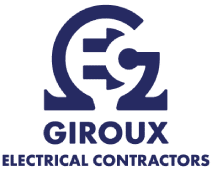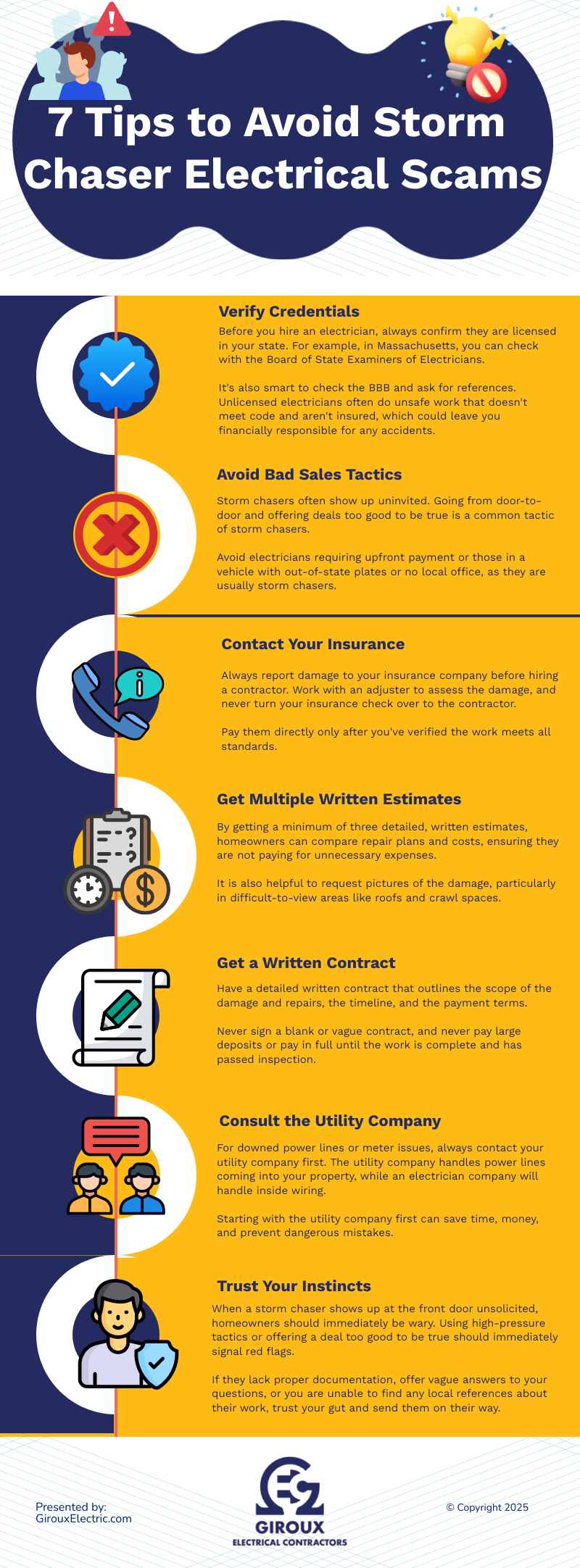Imagine a powerful nor’easter comes sweeping through Northborough, dumping a foot of snow and blowing winds up to 60mph, downing trees and power lines all across town. The power has been knocked out on Main Street, and basements have begun flooding on Lincoln Street. Before you know it, your power flickers, and then the lights go out. You’re left wondering, “What has caused the outage? Are you safe? And what will tomorrow bring?”
In Northborough and surrounding Massachusetts communities, severe winter storms, known as nor’easters, along with late summer thunderstorms and the occasional hurricane remnant, are a part of living in this amazing place. However, these extreme weather conditions frequently lead to power outages, downed lines, damaged electrical panels, or electrical surges. These electrical issues cause a sense of urgency for homeowners, anxious to get their electrical issues repaired and back to normal life. This makes homeowners a prime target for “storm chasers.”
In this guide, you will gain a better understanding of what storm chasers are, why they are a risk, and how to protect yourself after a storm. By detailing the different types of electrical damage commonly exploited by storm chasers, we aim to provide homeowners with the right tools to protect their homes (and their pockets) from these crafty, traveling contractors. We will provide seven practical tips you can use to make sure that your electrician company is a trusted, reputable, and licensed professional, guaranteeing your home is safe, secure, and ready for the next storm. But first, what is a storm chaser?
What Are Storm Chasers?
When you hear the words “storm chaser,” what do you think of? Some may think of someone chasing a tornado, trying to get as close as possible to the inside of the beast. Well, that’s not who we’re talking about. The “storm chasers” we’re discussing are traveling contractors, going from one storm-hit area to the next, looking to make a quick buck off damaged communities. Storm chasers offering electrical repairs are often unlicensed and unfamiliar with local regulations. Many come from out of state, having no local presence, office, or phone number. Taking advantage of homeowners who need electrical repairs, storm chasers can prey on vulnerable, storm-hit areas, offering fast and cheap repairs. But at what cost? Let’s learn why homeowners should be wary of storm chasers who just might be traveling tricksters.
Why You Should Be Wary of Storm Chasers
After a severe storm, communities are often left with downed power lines, damaged electrical panels, and the overwhelming stress of trying to restore their homes to normal function. In these vulnerable moments, storm chasers jump at the opportunity to take advantage of homeowners in these stressful situations. Below are some of the most common reasons that storm chasers choose to exploit homeowners after storms.
Urgency: Immediate needs that are created by storms, such as restoring power for an important medical device, create a situation where homeowners need their power restored and may not vet their electrician thoroughly.
Insurance Opportunities: Many times, electrical damage will involve insurance claims. Storm chasers who are scam artists can exploit this fact and offer to “manage” your insurance claim or inflate the damage report to make more money (insurance fraud).
Disrupted Communities: When large, damaging storms move through a community, infrastructure is damaged, and local services can be overwhelmed, making it difficult to find an electrician company in Northborough who can provide immediate service. This makes desperate homeowners a prime target for these transient contractors.
While storm chasers may appear to be helpful right after a storm (and some can be), homeowners should be wary, as the promise of a quick fix can come with hidden risks and long-term consequences. Below are several reasons homeowners should be wary of these storm chasers.
Poor Workmanship: Storm chasers often perform substandard work or repairs that do not meet code. They may not even be licensed or insured in your state. This can lead to safety hazards in your home, such as fires or continued power interruptions. You may even find that after the work is complete, it does not meet safety standards and will have to be completely redone.
Financial Risks: Storm chasers often use shady sales tactics that can put you at financial risk. Some may demand large upfront payments or even full payment, then disappear without completing the work. Some may even inflate repair costs for minor issues, causing you to spend more money than you would have if you had chosen a trusted electrician company in Northborough.
Insurance Fraud: Beware of the storm chaser who offers to handle your insurance claim or waive the deductible for you, which is illegal and can lead to trouble for the homeowner.
No Accountability: As quickly as storm chasers breeze into town, they also disappear. Without any local presence, it becomes nearly impossible to address poor work and demand accountability.
Homeowners must stay aware, as poor workmanship, financial risks, insurance fraud, and lack of accountability from storm chasers can turn stressful storm damage into a costly and dangerous situation. For a better understanding of why storm chasers hit weather-ravaged areas, let’s explore certain types of electrical damage that these scammers can exploit.
Types of Electrical Damage Storm Chasers Target
After a natural disaster or severe storm, the damage to communities can be devastating. The following are common types of electrical damage sustained after severe storms, and an example of how storm chasers can take advantage of the situation.
Fallen Power Lines or Service Mast Damage: During strong winds, which we often get here in Central Massachusetts, power lines and service masts can be damaged by falling trees or the wind itself. Storm chasers may charge homeowners for unnecessary replacements or perform non-compliant work without the proper vetting or knowledge.
Power Surges and Electrical Panel Damage: Fluctuations in the power grid or a lightning strike can cause a power surge and/or damage to electrical panels. Untrustworthy, traveling contractors may claim you need a full panel replacement when all that is really needed is a minor repair.
Damaged Wiring (From Water or Structural Damage): Flooding and wind damage can expose electrical wiring in your home, causing corrosion or fire hazards. Storm chasers may offer a quick fix, leaving unsafe wiring, putting the home and the occupants in danger.
Flood-Related Electrical Damage: Dam risks, like those associated with the Northborough Reservoir Dam, and flood risks from heavy rain can fill basements with water, damaging outlets, appliances, and so much more. Scamming storm chasers may perform inadequate repairs in this situation, leaving the home at risk for recurring issues.
Generator Issues: Having a home generator during a severe storm can be a lifesaver. However, improper installation and usage can lead to backfeeding and safety hazards. Storm chasers may install generators without the proper switches, which violates codes and puts the home at risk.
With a better understanding of the types of electrical issues storm chasers can take advantage of after a storm, now it’s time to learn how to protect your home and your wallet from these weather opportunists.
7 Tips to Avoid Storm Chaser Electrical Scams
This list has been created for homeowners to use to protect themselves from disaster drifters and avoid electrical repair scams in the aftermath of a damage-causing storm.
Verify Credentials: Always make sure an electrician company is licensed in your state. For Massachusetts, check with the Massachusetts Board of State Examiners of Electricians. Homeowners can also check the BBB and look for local references. Unlicensed contractors often perform unsafe work that does not meet code and are unlikely to be insured, putting homeowners at risk for liability if an accident occurs.
Avoid Bad Sales Tactics: Storm chasers often show up uninvited. Going from door-to-door and offering deals too good to be true is a common tactic of storm chasers. Avoid electricians requiring upfront payment or those in a vehicle with out-of-state plates or no local office, as they are usually storm chasers.
Contact Your Insurance: It is really important to report any damage to your insurance provider before hiring a contractor for repairs. Working with an insurance adjuster can help you assess the electrical damage and avoid fraudulent claims. Never turn an insurance check over to a contractor. Deal with your insurance company directly and then pay the contractor only after verifying the work meets standards.
Get Multiple Written Estimates: Having at least three detailed, written estimates from local contractors can help homeowners compare the scope of the repairs and the cost, making sure costs are not being unnecessarily increased. You can also request pictures of damage, especially in places you cannot see easily, like roofs, attics, and crawl spaces.
Get a Written Contract: Have a detailed written contract that outlines the scope of the damage and repairs, the timeline, and the payment terms. Never sign a blank or vague contract, and never pay large deposits or pay in full until the work is complete and has passed inspection.
Consult the Utility Company: For downed power lines or meter issues, always contact your utility company first. The utility company handles power lines coming into your property, while an electrician company will handle inside wiring. Starting with the utility company first can save time, money, and prevent dangerous mistakes.
Trust Your Instincts: When a storm chaser shows up at the front door unsolicited, homeowners should immediately be wary. Using high-pressure tactics or offering a deal too good to be true should immediately signal red flags. If they lack proper documentation, offer vague answers to your questions, or you are unable to find any local references about their work, trust your gut and send them on their way.
In the end, checking for proper licensure, local presence in Northborough, and looking for local references in surrounding areas, homeowners can ensure they are working with a local expert, knowledgeable about our storm risks and Worcester County building codes.
Your Best Defense Against Storm Chasers
Severe storms are an unavoidable part of life across Massachusetts, but falling victim to storm chasing scams doesn’t have to be. By arming yourself with these seven practical tips, staying alert, asking the right questions, and only working with a licensed and local electrician, you can confidently get through the aftermath of a storm and protect your home. Understanding how to verify credentials, avoid high-pressure tactics, and working directly with your insurance and utility company, you ensure that your electrical repairs are safe, reliable, and priced fairly. Storms may test the strength of our homes and communities, but with the right precautions, trusting your instincts, and relying on a local and reputable electrician company, you will know your repairs are safe, reliable, and secure, no matter what the storm brings.

